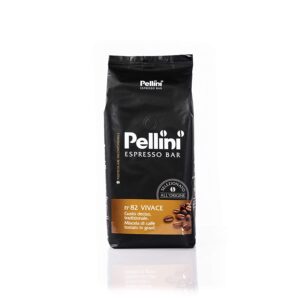
The popularity of coffee remains untainted for centuries. Many of us enjoy a regular cup of joe but need to avoid caffeine due to health issues, overconsumption, or even the time of day. In such cases, decaf coffee can be the answer. Usually, before people switch from their favorite morning pick-me-up to a low-caffeine alternative they seem to wonder if decaf coffee tastes differently?
In general, decaf coffee doesn’t taste very different when compared to regular coffee. An avid coffee drinker may find decaf coffee slightly sour in taste due to the processing of the coffee beans. A person who doesn’t drink coffee won’t distinguish a cup of decaf coffee from a regular one.
Coffee beans chosen for the process of decaffeination are different from regular beans. The complex process will usually give the deaf coffee a mild sour flavor.
However, someone who doesn’t drink coffee often would not be able to discern the difference between the flavor of decaf and a regular cup of coffee. Especially if both coffees came from the same place and were processed equally.
More pieces of research suggest that decaf coffee offers health benefits including reduced risk of cancer and type 2 diabetes. Thus, they are becoming more popular each passing day.
For coffee lovers who cannot take the caffeine hit, decaf coffee is the best way out.
Is Decaf Coffee Absolutely Caffeine Free?
According to the reports of the USDA or United States Department of Agriculture, a cup of 8-ounce decaf coffee comprises 2mg caffeine. Although, the caffeine content may alter from brand to brand. Some brands are known for having 15mg of caffeine in their decaf.
How does that compare to a regular cup of joe? An average 8-ounce cup of black coffee contains between 80 and 270mg of caffeine, according to caffeineinformer.com.
Even the same amount of black and green tea has more caffeine than decaf. A regular 8-ounce cup of black tea contains around 30 to 50 mg caffeine.
Obviously, decaf coffee has less caffeine than regular coffee or tea, but it’s not completely caffeine-free.
Unless a coffee drinker is extremely sensitive to the taste and flavor of coffee, he or she would not be able to understand the difference.

How is Coffee Decaffeinated?
Here are a few common processes by which decaffeination takes place:
Solvent Decaffeination
In this process, the caffeine is extracted from the beans with the help of a solvent. Ethyl acetate and methyl chloride are common solvents for the procedure. This process can be further divided into direct and indirect methods.
- Direct method: The coffee is soaked directly into the solvent and caffeine is removed as it gets soaked in the solvent.
- Indirect method: Here the coffee is soaked in boiling water for several hours for extraction of essential oils, flavor, and caffeine. Then this water is treated with the chemical solvent and heated. This evaporates the caffeine and solvent which makes the solution fit to be reintroduced to the coffee for soaking up the flavor and oils.
The CO2 Decaffeination Process
This is the latest addition to the prevailing decaf procedures where the coffee beans are taken in an extraction vessel. It is then sealed properly for the caffeine extraction process. The container is finally pressurized with liquid carbon dioxide.
For decaffeination of organic coffee, the Swiss Water Process is used where no chemical is involved. It is also known by the names of the Dihydro-oxide process and activated charcoal decaffeination.
To find out more about how decaf coffee is made, click here!
The Benefits of Decaf Coffee
Decaf coffee is similar to normal coffee without the added load of caffeine. Moreover, the health benefits they proffer are noteworthy.
Lowers the Risk of Cardiovascular Diseases
Though regular coffee is known for reducing multiple health issues, research titled Coffee Consumption and Health has shown that decaf coffee is efficient in reducing the risk of cardiovascular diseases.
Caffeine can trigger heart issues owing to its stimulating effects. As a result, switching over to decaf coffee can be greatly beneficial for you particularly if heart diseases run in your family.
Rich in Antioxidants
Coffee is revered for its high antioxidant content. The same number of antioxidants are also found in decaffeinated coffee.
To ensure that you get the same levels of antioxidants in your cup of decaf, make sure you opt for the variety that’s skillfully processed. Those who take coffee religiously for health reasons should now consider decaf for ruling out the ill impact of caffeine.
Improved Sleep Cycle
Coffee is one of the best stimulants in the morning. It keeps us going when we feel too tired to work. This is owing to the high caffeine content. Over time, it may wreak havoc on the stress hormones and sleep cycle.
Taking a cup of decaf coffee instead can save you from insomnia, improve your sleep cycle and make you feel energetic. Blocking caffeine is beneficial in curbing down stress and anxiety, particularly in people with anxiety disorders.
Reduced Risk of Type 2 Diabetes
Coffee is known for reducing the ill effects of various health issues but most of them stem from the high caffeine content. Thankfully, few studies have shown that coffee without the high caffeine content is also effective in lowering the risk of type 2 diabetes.
Decreases Acidic Effects
Coffee is highly acidic in nature and thus, dairy is often added to mitigate the acidic effects. But it is not suitable for those who are lactose intolerant. Many people also suffer from heartburn and acidity from drinking coffee.
The decaffeination process releases out the acidic content of coffee which makes the drink suitable for people suffering from gastroesophageal reflux disease and its side effects.
Summary
The taste of decaf coffee tends to be slightly sourer than its regular counterpart. Although the change in flavor is subtle, avid coffee drinkers will pick up on the variation immediately. The flavor of decaf will always depend on the quality of the coffee beans used in its production.
People who are sensitive to caffeine should limit their regular coffee intake and switch to the decaf variant.
Even for people under medications that may contraindicate with coffee, decaf is a feasible way to enjoy the drink minus the harmful effects of caffeine.
The individual variability of coffee is very high. For some people, even a cup of coffee can be way too much while for others, fifteen cups make no difference.
As a general rule, no individual should consume over 400 mg of caffeine in a day.
I’ve always seen coffee as a way of bringing people together. Everywhere I go people seem to enjoy a fresh cup of coffee and that’s what drives my passion. There’s always a new brew to master, and there’s always a new face to enjoy it with. Hitch a ride with me on a coffee-fueled adventure to find a perfect cup.


